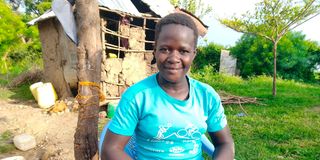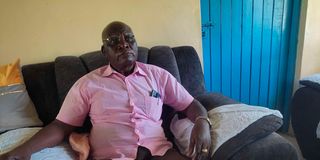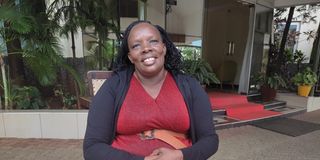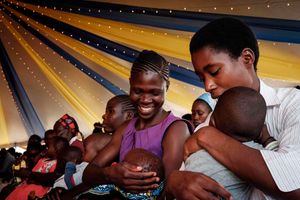Children pay heavy price as parents ignore life-saving vaccines

Eunice Aoko during the interview at her home in Kayundi, Siaya.Four out of her five children missed most of the early childhood vaccines.
What you need to know:
- About 20 per cent of children born in Kenya miss out on immunisation despite the government distributing vaccines in every corner of the country and awareness on importance of the jabs increasing.
In a world where science, religion, and culture often clash, Eunice Aoko stands firm in her decision not to vaccinate her children. The resident of Kayundi in Siaya County steadfastly believes in natural immunity; and that her children's fertility will be interfered with once they get immunised with modern medicine.
Like any other mother, her pregnancy journeys began with hopes, dreams and the overwhelming desire to protect her children. However, when she had to decide whether to vaccinate them, she found herself grappling with conflicting information and distrust of pharmaceutical companies. This is despite widespread medical consent on the safety and efficacy of vaccines.
Childhood immunisation is one of the most religiously followed routines among most Kenyan families. But despite vaccines saving lives, a percentage of the population remains suspicious of them; influenced by several factors including misinformation, messaging from religious leaders and authoritative organisations and cultural background.
Thirteen years ago, Eunice, then a resident of Muhoroni in Kisumu County, walked into a local health facility to deliver her firstborn child. She was wheeled into the delivery room and after three hours of labour, she gave birth to a boy. She would then be discharged the following morning.Despite delivering in hospital, her baby never received the first oral polio vaccine. Back at home, Eunice, who had given birth at the age of 11, decided not to visit the health facility for antenatal clinics, making the newborn miss out on almost all the early childhood vaccines.

Absalom Okode, a polio survivor, during the interview at his home in Anyuongi, Siaya County.
“Having a baby at such a tender age exposed me to a lot of stigma. I would spend most of my time indoors and only left the house whenever there was a pressing need,” says Eunice.
She says other factors that made her choose not to immunise her child were myths that vaccines can lead to infertility, and her religious background — where members do not prescribe to modern medicine.
During her second pregnancy, she never attended antenatal clinics for nine months , instead opting to visit a traditional birth attendant (TBA) for care and support. She gave birth under the supervision of the TBA and vowed never to visit a hospital.
The trend continued, with four of her five children being born at home.
Whenever any of her children fell sick, she would seek services of a herbalist. “My third, fourth and fifth born were all delivered under the care of an unskilled health provider,” says Eunice. While pregnant with her fourth born, the teen mother, who had then relocated to Kayundi Village in Siaya County, says she made attempts to visit Odede health centre, which is 10 kilometres away from her home.
She had to part with Sh200 as fare every month to attend the clinics, an amount she struggled to raise since she relied on menial jobs for survival. After three months, she stopped attending the clinics and opted for unskilled delivery. She gave birth at home. The same happened to her fifth child, but luckily this time round, she delivered under the supervision of a Community Health Promoter (CHP) having relocated from her native community.
The CPH ensured that the fifth child was immunised and even the four older children got some of the vaccines that could still be administered at their age. Eunice notes that no one had ever explained to her why her children needed to be immunised.
“If I had known the importance of having my children immunised, I would have changed my perception towards vaccines, but there was no one to explain to me or make me understand. I am lucky that the CHP came my way and now my fifth child is fully immunised. The rest got some vaccines,” says the 24-year-old mother of five . Eunice’s four children are among the 20 per cent of Kenyans who miss out on immunisation despite efforts by the government to make the vaccines available and accessible in health facilities.

Bertha Akinyi , a polio survivor, during the interview in Kisumu.
According to Kenya Demographic Health Survey (KDHS) 2023, early childhood vaccine uptake has improved to 80 per cent.
The leading county in vaccine uptake is Vihiga, Tharaka Nithi and Nyandarua at 95.9,94.9 and 94.9 percent respectively. The least performing counties are Garissa 22.9, Mandera 29.1, Wajir48.6, West Pokot 48.6 and Turkana 60.1 per cent.
The report also revealed that out of every 10 children in the country, two are never vaccinated; posing a threat to those who have been vaccinated – they increase the opportunity for a disease to spread through the community.
Dr Elizabeth Kuta, a consultant paediatrician and neonatologist at Aga Khan Hospital, Kisumu says the country should be worried about children who miss out on immunisation.
“The 20 per cent who are not vaccinated are at a high risk of contracting and causing outbreaks of vaccine-preventable yet life-threatening diseases,” says Dr Kuta.
The paediatrician describes vaccines as an antigen administered to an individual to trigger an immune response similar to what can be triggered if the person had gotten the actual infection. In response, the antigen offers the body immunity against life-threatening illnesses.
The health expert says it is important to administer the vaccine in time as prescribed to prevent mortality cases among the under-five population; who are highly susceptible to infections. From the time they are born, children always receive a range of vaccines administered either orally or as an injection. The vaccines act as prevention against severe polio, tetanus, diphtheria, pneumonia, mumps, rubella, whooping cough, malaria, measles, and meningitis, among other illnesses.
Dr Akuta explains that it is important for a pregnant woman to attend both antenatal and post-natal care clinics, where maximum education is offered on maternal child health; including the role of vaccines.
Most of the vaccines are administered under the age of two years.
Dr Walter Otieno, a Western Kenya-based paediatrician, says despite the overwhelming evidence supporting the safety and efficacy of vaccines, misconceptions and misinformation continue to sow doubt and hesitation among some parents. He emphasises the importance of relying on evidence-based information when making decisions about children's health.
"Understandably, parents may have questions or reservations about vaccines, but it's crucial to have open, honest conversations with healthcare providers and seek reliable sources of information to address any concerns.
“Vaccination is the safest way to protect children and pregnant women from a long list of serious and potentially life-threatening illnesses. Vccines prevent at least 25 diseases, including polio, hepatitis B, whooping cough, measles, diphtheria, measles, tetanus, diarrhoea, pneumonia and cervical cancers,” Dr Otieno notes.
He explains that vaccines protect children by preparing their immune system to recognise and fight deadly infections. “When a child misses a vaccine and there is an disease outbreak, the likelihood of that child going down with the illness is high.”
Eunice says her major concern is the fact that her firstborn, who is now 13 years, is always sickly. The teenager is always in and out of the hospital, with health workers citing low immunity.
Her third child, who only received one vaccine, had delayed milestones and was only able to start walking at the age of three and a half years.
“There is a big difference between my fifth child and the other four who missed out on almost all the vaccines. She is stronger than all her siblings. She also learnt to do several things at a young age,” says Eunice.
While she is optimistic that her four babies will survive even if they did not get all the life-saving vaccinations, Dr Otieno says the likelihood of them contracting debilitating diseases is very high. The World Health Organization (WHO) says vaccines have been proven to prevent more than 20 life-threatening diseases, helping people of all ages live longer and healthier lives.
According to the global health body, immunisation currently prevents more than five million deaths every year from diseases like diphtheria, tetanus, pertussis, influenza and measles. Out of every 1,000 children, 39 die due to diseases that can be prevented by vaccination, according to WHO data. Some of the vaccines administered to children in public hospitals are polio, BCG (to fight tuberculosis), DPT (diphtheria-tetanus-pertussis), Hb (Hepatitis B) and the most recent addition, Hib, which has proven effective in reducing early childhood meningitis in many countries. At birth, infants are injected with BCG in their arms. This is mandatory as stipulated in Kenya’s regular schedule of vaccinations, developed by the Ministry of Health. The vaccine helps protect the newborn against tuberculosis , including TB Meningitis (an infection of the brain) and miliary TB (widespread infection).
At six months, babies are vaccinated against flu and given Vitamin A. At seven months, they get the second dose of the flu vaccine. At nine months, the measles vaccine and the first dose of chickenpox jab should have been administered.
At 11 months, a second dose of chickenpox is administered.
“These vaccines, according to the country’s immunisation framework, ought to be given at the scheduled ages if they are to work effectively,” says Dr Otieno. A few kilometres from the home of Eunice, we meet Bertha Akinyi, a survivor of polio from Uyoma, Rarieda Constituency.
She contracted polio, which caused long-term disability, after missing the polio vaccine.
Although she was born a healthy baby, tragedy struck when she was eight years old. She developed a swelling on the right leg from the hip down to her thighs and had to be rushed to Jaramogi Oginga Odinga Teaching and Referral Hospital. "Doctors told my mother I had a polio attack," says Bertha. Her parents tried to use herbs, but the condition deteriorated. Eventually, she was left limping, exposing her to stigmatisation both in the village and in school. The seventh born in the family of 12 says that with the growing stigma, she confronted her mother and asked why she was different from her other siblings. "My mother said although I was born in a health facility, I missed the vaccines since she had been sick and financially unstable and did not adhere to the immunisation schedule," she says.
Bertha, a mother of three, says she is not sure if she got all the other vaccines and she has never asked her parents since her concern was the cause of her disability.
Having learnt from her own experience, Bertha, now in her 30's, ensured all her children received childhood vaccines.
"I never wanted my children to end up like me. That is why I ensured they were vaccinated. I would like to urge other parents to ensure their children get the vaccines, which are proven to protect us from a range of deadly diseases, "she says.
Mr Absalom Okode, also a polio survivor, says he had a polio attack at the age of one and a half years. Born in Anyuongi Village, Siaya County, he lost his ability to walk after missing out on polio vaccine. He spent most of his early years crawling until his parents resorted to seeking medical attention at a hospital in Nairobi. Since then, he has been walking with the aid of surgical elbow crutches due to his weakened knees and legs. “What pains me is the fact that a number of children still miss the vaccines that are administered free of charge in health facilities.”
The World Health Organization recommends an oral polio vaccine dose immediately after a baby is born —a zero dose — followed by a series of three primary doses and a minimum of one inactivated dose.
Dr Akuta says one of the roles of hospital deliveries is to ensure that the women and children receive skilled care in case of emergency.
Facility deliveries also ensure that children get their first oral polio among other vaccines.
If the children miss out on their first vaccine, they can still get the remaining subsequent vaccines in a protocol for catch-up vaccines.
Dr Kuta, however, notes that children who miss some of the doses may not have a strong immunity compared to those who received all the doses.
“Once given the vaccines, a good number of the population often develops effective immunity. Those who do not the vaccines appropriately don’t form enough antibodies and could eventually get severe forms of diseases,” says the neonatologist.
For maximum protection, she says the government always organises a booster dose in case of disease outbreaks, which is often administered to children under the age of five.
Dr Kuta adds that while it is not a guarantee that a person who misses the vaccines will fall ill when exposed to preventable diseases, they are likely to suffer from life-threatening conditions. While the vaccines are proven to be effective, there are some myths and misconceptions that still act as a barrier to getting immunised.
Having more children vaccinated, however, offers the few who are unvaccinated hard immunity by limiting the circulation of disease-causing viruses and bacteria.
“I would encourage all mothers to bring all babies for vaccination. It is the responsibility of parents to ensure their children are immunised because the babies do not have a say. We are advocates of children so we recommend they be vaccinated as required.
She adds: “In the end, the decision to immunise a child is not just about safeguarding their health in the present moment, but also ensuring a brighter, healthier future for generations to come.”





